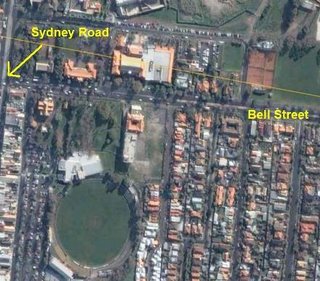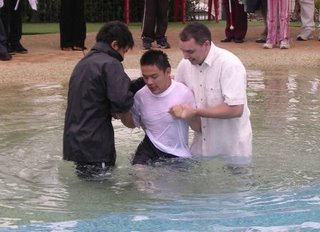The neighborhood all kind of blends in to the surrounding neighborhoods; it’s a city, and cities do that. We’re just off of a side street near the corner of two major roads: Bell Street and Sydney Road, which are very different from each other.
Bell Street is a major travel street, mostly for getting people from one side of the north end of the city to the other. While this is a bit of an exaggeration (for example, Stolberg Café is on Bell St, among other businesses), it holds for the section we’re on. Sydney Road, on the other hand, while well traveled (by car, tram, bike, and pedestrian traffic), is a major commercial center. The entire length of it (extending all the way into the city) is full of shops and restaurants and cafes of many colorful varieties. Sydney road is one of the reasons we chose Coburg.

One of the great things about our unit is that it’s just close enough to Sydney road to walk or bike there (a tram stop is right at the intersection with Bell and Sydney, so it’s close, and the train station is another two minute walk from there), and just far enough from both Bell and Sydney that we can’t usually hear any of the traffic. Both roads can be pretty loud, especially in the morning and in the early evening.
* * *I was sitting in the living room the other night trying to listen to some music while I was waiting for Liz to finish with dinner (for those of you that think I wasn’t helping, you’re wrong – I’d already done all the dishes), and I wasn’t having so good a time of it. For some reason, I couldn’t hear the music very well. I kept turning it up, but nothing seemed to help. But a funny thing happened after she finished with whatever pots were in need of attention.
She turned off the hood fan over the stove, and suddenly the music became clear as day; I could hear every note without a problem. It’s as if I couldn’t hear the noise apart from the music until the noise was turned off.
It was then that something hit me about our stay out here in Australia. Ruth called it “detox” for me, as if our time here is a sort of cleansing period for my mind, a chance to take all my assumptions on life, church, and God, and start over. I think she’s right, and I think that listening to my music has helped me understand: sometimes you just have to step away from all that is familiar in order to hear the music of truth.
In church at home, they always talked about “taking quiet times” during the week to hear God better, but I think that it’s more than that. I think it’s about shutting EVERYTHING off: all of my hobbies, all of my work, all of my play … everything I could (let’s be realistic, it’s not a good idea to shut off stuff like your marriage). I’m detoxing my system of the American culture in order to see it for what it is. When you see the Bible addressed in another culture, you see what parts of religion are of God and what are of the culture of man.
It’s not as if I’ve made a very large jump here either. I’m only in Australia, and while that’s a really long way away from home, it’s nothing compared to what it might be like to live somewhere in Africa for a year, or in Thailand, or in China or India. There’s some crazy stuff that goes on there (go rent the movie “Born into Brothels,” a documentary about children born in the Red Light District of India); the gospel takes on a whole new meaning for the missionaries that go to those places.
But even here, it’s different. I see things that I never saw in America, though I’m sure they were all around me all the time. Liz and I just went on this “retreat” with the Dobsons and their old church family. At that retreat I met Aaron.
When I first meet Aaron, he was sitting down, and there was something about him that I couldn’t quite place my finger on. Then he got up and started walking. When he walks, he needs help; his feet are unsure of themselves, his legs slightly bowed. His slender, slightly deformed face belies the clarity of his thinking, and this weekend I’ve been privileged to learn about God in a way I didn’t expect.
Aaron was baptized that weekend, a decision he made after confronting someone at a youth camp who was kind enough to talk with him (I guess he’s not the sort of person that most people like to talk to that often). He asked the hard question: “why did God make me like this? Why am I deformed?” The person, whom he now calls a friend, answered with the best answer he could: “you have a story to tell, and just because you’re not like everyone else doesn’t mean it’s any less valuable. Your story will inspire others.”
And it has.
His friend, later on, sent him a DVD of “Trading My Sorrows,” a song which Aaron has rightfully adopted as his own. Among my friends, it’s no secret that I can’t stand Hillsongs music. But I found new meaning in that simple song this weekend, tapping along as Aaron sang at the top of his lungs (with passion, without pitch), “I’m trading my sickness, I’m trading my pain, I’m laying them down for the Joy of the Lord.”
 Aaron is the embodiment of that song. His journey has led him through pain and suffering which I can’t begin to understand. But here he is, delighting in Jesus and that simple melody, his face glowing despite his physical deformity. His story is an encouragement to us all: though our deformities, our iniquities, our pain and suffering might not be physical, God has the power to heal us. And sometimes, that healing is just a matter of reorienting our perspective: what we think of as deformity might really be a gift.
Aaron is the embodiment of that song. His journey has led him through pain and suffering which I can’t begin to understand. But here he is, delighting in Jesus and that simple melody, his face glowing despite his physical deformity. His story is an encouragement to us all: though our deformities, our iniquities, our pain and suffering might not be physical, God has the power to heal us. And sometimes, that healing is just a matter of reorienting our perspective: what we think of as deformity might really be a gift.
And I’ve only been here for four weeks. The longer I’m here, the more I wonder what other assumptions I’ve made without knowing; what matters, and what is just made up? What is the music, and what is the noise?
